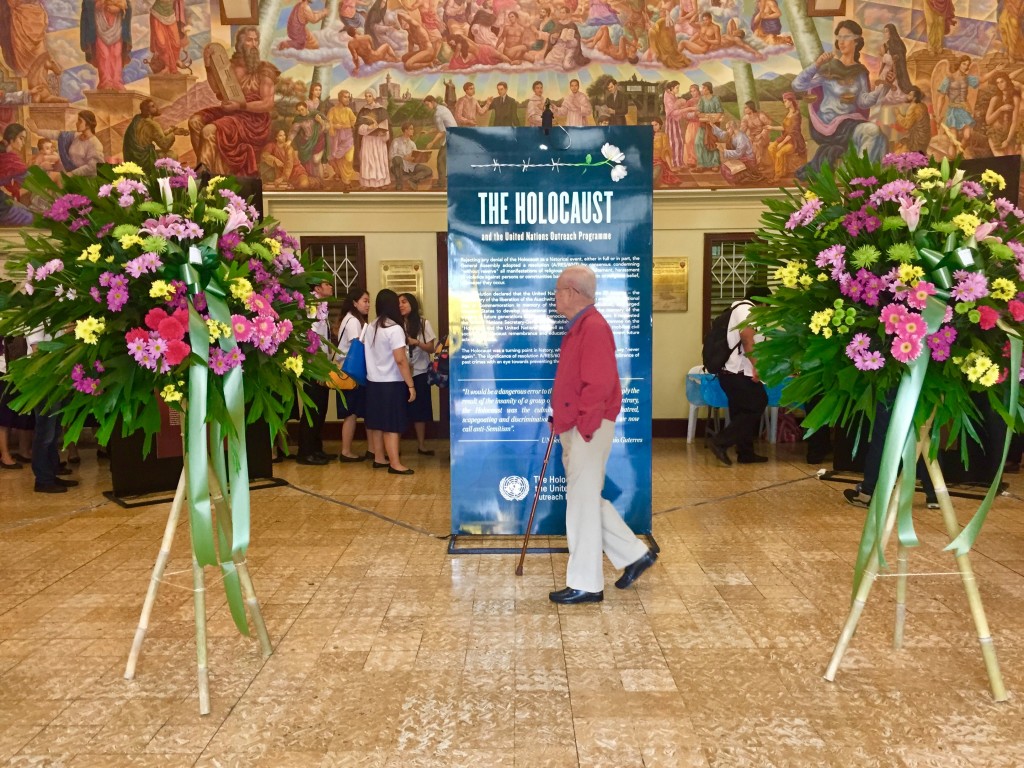
The exhibit “State of Deception: The Power of Nazi Propaganda,” launched on Feb. 10, 2017 at the University of Santo Tomas, includes a set of posters from the United States Holocaust Memorial Museum, which is a living memorial to the Holocaust. Photo by Kristine Angeli Sabillo/INQUIRER.net
As a young girl, Hadass Nisan had nightmares from hearing stories about the Holocaust.
She imagined gas chambers, crying babies and people killed by dogs.
“Should I say more? I’m not sure,” she tells a hundred or so students attending the Holocaust Remembrance event at the University of Santo Tomas last week.
Nisan, who is now Deputy Chief of Mission of the Embassy of Israel in Manila, explained that while she did not experience the Holocaust or the genocide of European Jews, her grandparents survived the Holocaust in Germany.
And from their stories and the things she learned in school, she was exposed to things that “you could not even imagine.”
“For many years, seriously, I had nightmares,” she said.
The Holocaust refers to the systematic and state-sponsored persecution of millions of Jews by the Nazi regime, which came to power in Germany in 1933. By the end of World War II, six million Jews have been murdered, many in concentration camps where they were subjected to forced labor.
Fearing the repeat of such harrowing experiences, Nisan asked her mother if the Holocaust can happen again. But instead of assuring her that they were safe in Israel, her mother said that since “it happened in the past it might happen again.”
Lessons for everyone
Today, Nisan is among those who seek to educate people in order to prevent another Holocaust.
“The Holocaust is not an issue of the Jews…It is the issue of (every) human being,” she said.
Narcisa Tabirara, UST Assistant Dean of the Faculty of Arts and Letters, said remembering the Holocaust is important, especially at a time when the world is seeing “images of instability.”
“I hope we can see how the past can impact our present lives and to ensure we all work together to create a kinder and gentler world,” she said.
Meanwhile, UNIC’s information officer Teresa Debuque pointed out that the Holocaust was considered a turning point in history by the UN General Assembly.
“It prompted the world to say, ‘Never again,’” she said. “Never again will the community of nations sit idly by while an entire people…is exterminated out of a misguided, inflated sense of racial superiority of another.”
Debuque said people should remember what human beings are capable of, that there are “no limits to the depth that one can sink.”
During the program, the audience watched the documentary “The Path to Nazi Germany,” which detailed the prevailing social and economic realities that led to the rise of Nazi Germany. It showed how Adolf Hitler and the Nazis gained the favor of German citizens as they promised to regain the country’s strong economy and image.
Finding balance
Asked how the present generation can avoid making the same mistakes, especially amid US President Donald Trump’s earlier plan to ban travelers from seven Muslim majority countries, Nisan said people should find a balance between nationalism and globalism.
She said each nation has values that reflect its people’s character and identity.
“The opposite of having an identity and being part of a nation is the pluralism, to accept everybody, to be a global person, to love everyone,” she said.
“These are two edges [and we] need to find balance between them,” Nisan said. “Between the two edges of nationalism and globalism, there is something in between.”
Nisan said she decided to become a diplomat “to heal the world.”
She said people should not be bystanders and instead “do as much as we can to prevent such catastrophes.”
She called the Filipino people the “kindest people on Earth” who “accept everybody.”
During World War II, the Philippines became instrumental in the saving of lives of more than a thousand Jews by opening the country’s doors to refugees.
A documentary on the event, titled “Rescue in the Philippines: Refuge from the Holocaust” was screened at Malacañang Palace in 2014.
READ: How Filipinos became heroes during the Holocaust

